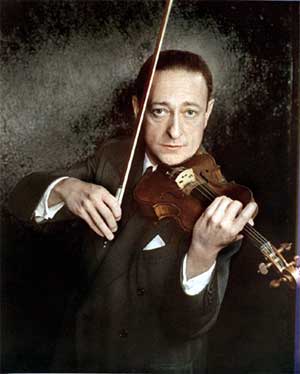
Heifetz is considered to be one of the finest violinists of all time. His technique and the tonal beauty of his music is still considered to be unequaled by many current violinists. His conservative stage demeanor and personal rigidity, however, caused some critics to characterize him as being mechanical or even cold. Yet, he has been a major influence in defining the way modern violinists approach the instrument. He was known for the use of rapid vibrato, emotionally charged portamento, fast tempos, and superb bow control. He was able to create a highly distinctive sound that made his music instantly recognizable to aficionados.
Although Heifetz made recordings in Russia as early as 1910, most of these are quite rare. After his Carnegie Hall debut, however, Heifetz began making recordings for the Victor Talking Machine Company; and its successor, RCA Victor. The Judaica Sound Archives has created four audio albums consisting of 32 of these recordings which were produced between 1917 and 1922 and are in the public domain.
Heifetz was often a controversial figure. He was attacked in Israel in 1953 because he insisted on including the works of Richard Strauss and Richard Wagner in his repertoire despite the strong sentiment at the time that they were Nazis. On the other hand, he was a strong critic of the Soviet Union and was considered to be a defector by musicians who stayed in Russia.
In his later years he taught at UCLA and the University of Southern California. His fame as a violinist and teacher was so extensive and his name became so iconic that he was referenced in such pop culture entertainments as The Muppet Show (1977), The Muppet Movie (1979), Broadway Danny Rose by Woody Allen (1984), The Golden Girls (1987), Star Trek: The Next Generation (1989), and Hollywood Ending by Woody Allen (2002).
These recordings were produced prior to 1923 and are in the public domain.
















































































































































